المراقبة والتقييم
لا تتعلق معظم تحديات الرصد والتقييم، مثل الافتقار إلى الاستثمار والقدرات الكافية، تحديدًا بالمساعدات النقدية والقسائم. لكن تلك التي تتعلق في المقام الأول برصد نتائج عمليات النقل غير المقيدة. ويمكن أن تجعل مرونة التحويلات النقدية من الصعب تحديد مؤشرات النتائج المناسبة، لأنها قد تتضمن مجموعة من المؤشرات القطاعية والشاملة. وفي الوقت نفسه، هناك قيود على جمع بيانات دقيقة حول كيفية إنفاق التحويلات النقدية.
التزم الموقعون على الصفقة الكبرى بضمان وجود آليات الرصد والتقييم ذات الصلة فيما يتعلق بالنقد، وزيادة فهم التكاليف والفوائد والآثار والمخاطر المتعلقة بالنقد بالنسبة للطرائق الأخرى. بناءً على ذلك، يحتوي مسار الصفقة الكبرى على نقاط عمل بما في ذلك تطوير مؤشرات نتائج مشتركة للمساعدات النقدية متعددة الأغراض، ومقاييس لتحليل القيمة مقابل المال. تم تقييد التحليل المنهجي للقيمة مقابل المال بسبب عوامل تشمل عدم وجود نهج متفق عليها، والحاجة إلى بيانات نتائج عالية الجودة، وطبيعة التحليل.
الأولويات الحالية
في إطار الالتزامات النقدية للصفقة الكبرى، شاركت شبكة CALP (مع الوكالة الأمريكية للتنمية الدولية وخدمات الإغاثة الكاثوليكية) في تطوير مؤشرات النتائج للمساعدات النقدية متعددة الأغراض. وتُتاح مسودة الاختبار حاليًا باللغات الإنجليزية والفرنسية والإسبانية عبر مكتبة شبكة CALP.
Related initiatives
Featured content

Multipurpose Cash Outcome Indicators – Final Draft for Testing
Guidelines and Tools
Note that the MPC indicators have now been revised. Please click here to access the updated Multipurpose Outcome Indicators and Guidance, which is available in Arabic, English, French and Spanish. Multipurpose Cash Outcome Indicators – Final Draft for Testing Multipurpose cash (MPC) is a type of assistance intended to enable people to meet their basic needs through local...

Monitoring 4 CTP: Monitoring Guidance for CTP in Emergencies
Guidelines and Tools
This guidance provides a central resource to promote a common understanding of the most important monitoring considerations for humanitarian projects using cash transfer programming (CTP). The primary audience for this guidance is field-level practitioners, from organisations directly involved in the design, implementation, monitoring, and accountability of projects using cash and vouchers...

Cost-Efficiency Analysis of Basic Needs Programs: Best Practice Guidance for Humanitarian Agencies
Guidelines and Tools
The Efficiency, Effectiveness and Value for Money Sub-Workstream is pleased to share the final output on Cost-Efficiency Analysis of Basic Needs Programs: Best Practice Guidance for Humanitarian Agencies (attached).
Cost-efficiency analysis estimates the ratio of program costs to outputs created, allowing you to compare cost-per-output for programs which all produced the same output. Such...
Thematic lead
Latest
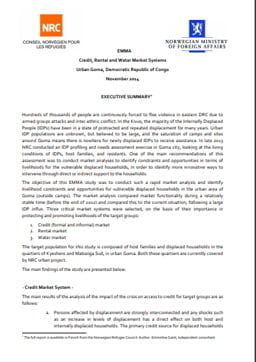
NRC – EMMA on Credit, Rental and Water Market Systems, Urban Goma, DRC, Nov 2014 – Executive Summary
Report
Hundreds of thousands of people are continuously forced to flee violence in eastern DRC due to armed groups attacks and inter-ethnic conflict. In the Kivus, the majority of the Internally Displaced People (IDPs) have been in a state of protracted and repeated displacement for many years. Urban IDP...

The Supply Chain in Cash and Voucher Programmes
Presentation
This video explains how supply chains play a critical role in cash and markets based humanitarian programmes. Everything we do in a crisis has an impact on local markets; cash and voucher based assistance only works when we monitor markets and maintain our own supply chain for when it’s needed.

Social Transfer Programme in Nepal: An overview
Presentation
A overview of the social transfer programme in Nepal.

Is Cash Transfer Programming ‘Fit for the Future’? – Final Report
Report
This report presents the results of a 2013 research study entitled, Is Cash Transfer Programming ‘Fit for the Future’? The research was commissioned by the the CALP Network and undertaken by the Humanitarian Futures Programme (HFP), King’s College London. The project intends to understand...

Market Analysis for Preparedness and Development: Piloting Innovation in Guatemala
Report
This case study charts the process, successes and learning from Oxfam’s pilot joint market analysis in Guatemala 2013. One of the key lessons is that, despite the initial reluctance to market based programming approaches, a critical impact of the assessment has been increased interest from other...
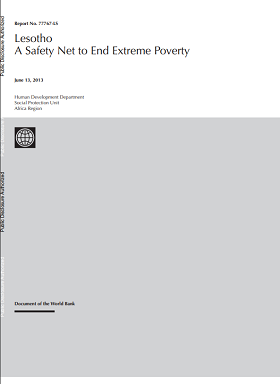
Lesotho: A Safety Net to End Extreme Poverty
Report
The objective of this study is to help the government to decide what role safety net and transfer programs should play in the coming 5 to 10 years. It seeks to answer three questions: Can increased spending on transfers accelerate poverty reduction in the medium to long term? Which groups and aspects of...
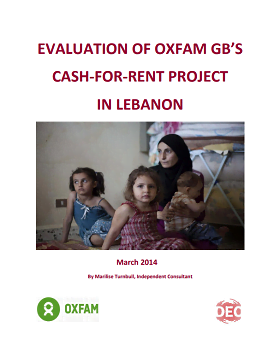
Evaluation of Oxfam GB’s Cash for Rent Programme in Lebanon
Report
In March 2013 the DEC launched an appeal to respond to the humanitarian crisis caused by the deepening civil war in Syria. Oxfam GB was allocated a total of £1,189,797 of the £12 million raised, of which it apportioned £237,951 to assisting Syrian refugees in Lebanon. This evaluation found that Oxfam...
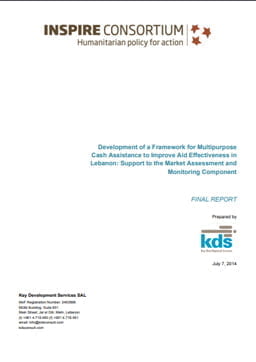
Development of a Framework for Multipurpose Cash Assistance to Improve Aid Effectiveness in Lebanon: Support to the Market Assessment and Monitoring Component
Report
The objective of the three market assessments presented in this report is to provide the interagency cash transfer programming working group (CTPWG) with meaningful and actionable information on the market impact of cash assistance in Lebanon. This report is also intended to inform decision making on...
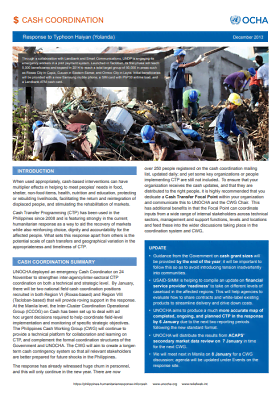
Response to Typhoon Haiyan (Yolanda)
Report
When used appropriately, cash-based interventions can have
multiplier effects in helping to meet peoples’ needs in food,
shelter, non-food items, health, nutrition and education, protecting
or rebuilding livelihoods, facilitating the return and reintegration of
displaced people, and stimulating the...

Emergency Relief Coordinator’s Key Messages On Typhoon Haiyan/Yolanda
Report
Emergency Relief Coordinator’s Key Messages On Typhoon Haiyan/Yolanda

CSC ATM and Card & WFP E-Card (electronic voucher)
Report
Explaining the 2 card system

Philippines: Typhoon Haiyan
Report
Situation Report No. 14 (as of 20 November 2013)
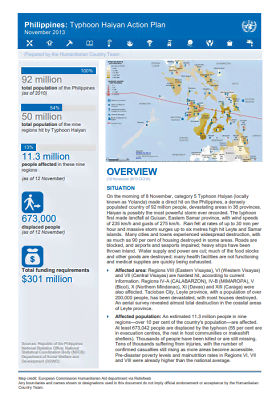
Philippines: Typhoon Haiyan Action Plan
Report
On the morning of 8 November, category 5 Typhoon Haiyan (locally
known as Yolanda) made a direct hit on the Philippines, a densely
populated country of 92 million people, devastating areas in 36 provinces.
Haiyan is possibly the most powerful storm ever recorded. The typhoon
first made landfall at Guiuan,...

Cash Emergency Preparedness (CEP) Assessment: Myanmar
Policy paper
Cash transfer programming (CTP) in emergencies is not new in Myanmar, with the first examples going back at least to Cyclone Nargis in 2009. CTP has also been used in humanitarian settings such as Kachin State. However, CTP is not yet being widely used for the current conflict context in Rakhine State due...

Women’s Empowerment and Nutrition
Report
Research on the relationship between women’s empowerment and nutrition, particularly child nutrition, is continually expanding. As part of the quest to achieve gender equality, women’s empowerment has
increasingly been the focus of many development interventions. In addition to being an end goal in...
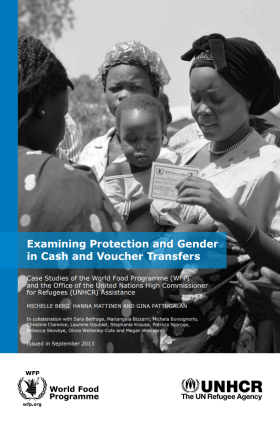
Examining Protection and Gender in Cash and Voucher Transfers
Case Study
With cash and voucher transfers increasing as a form of humanitarian assistance, the World Food Programme (WFP) and the UN Refugee Agency (UNHCR) teamed up to study the potential protection and gender impact of such transfers. While much research had been done about economic and market impacts of cash and...
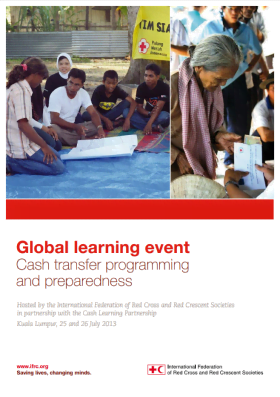
Global Learning Event Report: Cash transfer programming and preparedness
Report
As the investment in cash transfer programming (CTP) continues to grow, there is a desire to find ways to carry out this approach faster, more often and more effectively. As a result, the integration of CTP into preparedness and contingency planning is becoming more important. A global learning event on...
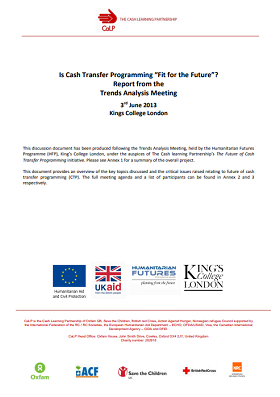
Is Cash Transfer Programming “Fit for the Future”? – Report from the Trends Analysis Meeting
Report
This discussion document has been produced following the Trends Analysis Meeting, held by the Humanitarian Futures Programme (HFP), King’s College London, under the auspices of The Cash learning Partnership’s The Future of Cash Transfer Programming initiative. Please see Annex 1 for a summary of the...
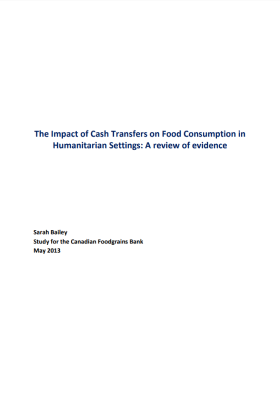
The Impact of Cash Transfers on Food Consumption in Humanitarian Settings: A review of evidence
Report
In order to make informed decisions on when to use cash, vouchers and food aid, it is important to understand evidence on their appropriateness and effectiveness in achieving certain objectives. A main objective of the Canadian Foodgrains Bank is to improve food consumption in emergencies, and this paper...
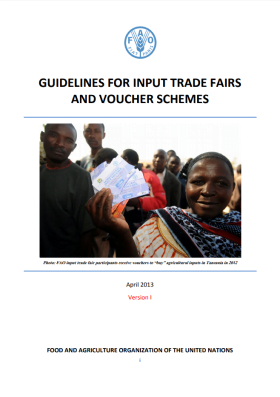
Guidelines for Input Trade Fairs and Voucher Schemes
Guidelines and Tools
One of the main causes of food insecurity for farmers in rural areas is limited access to agricultural inputs. The Food and Agriculture Organization of the United Nations (FAO) works to set up input trade fairs and voucher schemes to provide poor, vulnerable and food insecure farmers with access to the...
